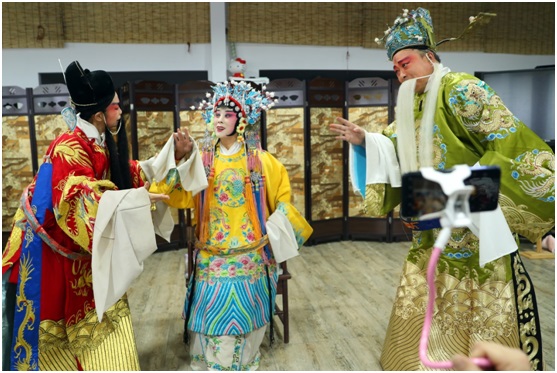By Zhang Tengyang, People’s Daily
In the sounds of gongs, drums, and suona horns, Liu Lisha, head of aHebei Clapper Opera troupe in Shijiazhuang, capital of north China’s Hebei province, strode onto the stage with an ancient army flag, and started to perform a traditional Chinese opera Mu Guiying Gua Shuai (Mu Guiying Takes Command) for local residents in Nanlijiatuan village, Zhaoxian county, Shijiazhuang.
Liu is also a member of the National Committee of Chinese People’s Political Consultative Conference (CPPCC). During the annual session of the CPPCC last year, she submitted a proposal for promoting the integration of traditional Chinese culture and tourism, while this year, her proposal highlights protecting and tapping into traditional Chinese opera.
In the central and southern areas of Hebei province where watching traditional operas is part of the everyday life of rural residents, almost every village has a stage. Every year, Liu and members of her troupe perform traditional Chinese operas in rural areas from the first month of the lunar year to the Dragon Boat Festival celebrated in the fifth month of the lunar year.
In recent years, local governments of Shijiazhuang have intensified support for operas and programs featuring traditional Chinese culture through measures including paying for the shows performed for local residents. Hebei Clapper Opera troupes can get an allowance of 7,500 yuan (about $1,057) for each show they present.
“Our troupe stages 200 shows in rural areas every year. We try our best to meet the needs of local people,” Liu said.
Over the years, Liu’s troupe has often performed during temple fairs in rural areas. The dazzling juggling and products sold at temple fair, such as local specialties, clothes, snacks, and toys, can usually attract a lot of people from neighboring villages and even urban areas.
As she performed during such occasions, Liu found that some people were attracted by the troupe’s performance of Hebei Clapper Operas while strolling around at temple fairs.
Some people came to temple fairs specially for the show, according to Liu, noting that these people often stroll around and shop during intervals, and came back with snacks to continue enjoying the performance after the interval.
“Performances of traditional Chinese operas and temple fairs in rural areas complement each other. The integration of them can not only meet people’s cultural needs, but also boost consumption in local areas,” Liu said.
As a member of the National Committee of the CPPCC, Liu has always been thinking about how to carry forward and further develop traditional Chinese opera.
Inspired by the results of the integration of traditional Chinese opera performances and temple fairs, she submitted a proposal for promoting the integration of traditional Chinese culture and tourism to the CPPCC last year, suggesting that Hebei Clapper Opera performances should be presented near some scenic spots and historical sites.
On the Mid-Autumn Day last year, Hebei Clapper Opera troupe of Shijiazhuang staged a live-action performance Chang’e Ben Yue (Chang’e Flying to the Moon) in Zhengding old town in Shijiazhuang’s Zhengding county.
“Many tourists watched the performance. I walked around there and heard that a nearby shop selling Shaomai, a kind of steamed dumpling, saw its sales reach 100,000 yuan ($14,088) that day, though it doesn’t have many customers normally,” Liu said.
“Some local traditional Chinese operas suffer greater loss of scripts than Hebei Clapper Opera. Today, our entire troupe can perform over 40 plays a year, while in the past, some senior artists could perform more than 100 plays alone in a year,” said Liu, who hopes that local operas can be recorded with modern technologies.
“We are often told by our audiences that they want to watch modern operas. And we are trying harder to write new plays,” Liu disclosed.
With her proposals and idea of creating original plays all being based on what she has experienced, heard, seen, and thought of over years while performing for and talking with local residents, Liu’s proposals and new idea are bound to serve people’s cultural needs better once they are implemented properly.
“People’s satisfaction is the greatest encouragement to us,” Liu said, adding that serving people’s cultural needs is the greatest honor and the most important responsibility for her.












Leave a Comment